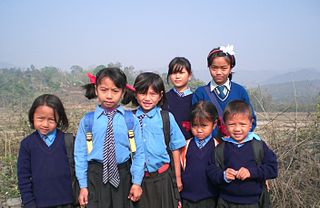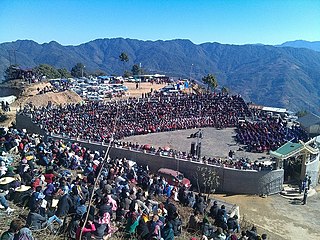Related Research Articles

Nagaland is a state in the north-eastern region of India. It is bordered by the Indian states of Arunachal Pradesh to the north, Assam to the west, Manipur to the south, and the Naga Self-Administered Zone of the Sagaing Region of Myanmar (Burma) to the east. Its capital city is Kohima and its largest city is the twin Chümoukedima–Dimapur. The state has an area of 16,579 square kilometres (6,401 sq mi) with a population of 1,980,602 as per the 2011 Census of India, making it one of the least populated states in India.

The Naga People's Front (NPF) is a regional political party in Nagaland, Manipur and Arunachal Pradesh. It headed the Nagaland government with the Bharatiya Janata Party, as part of the Democratic Alliance of Nagaland from 2003 to 2018. NPF is coalition partner of N. Biren Singh ministry led BJP government in Manipur. The party ideology includes Conservative Christianity, thus encouraging it. It demands and supports greater autonomy for Naga areas and Naga cultural Nationalism.

The Insurgency in Northeast India involves multiple separatist and jihadist militant groups operating in some of India's northeastern states, which are connected to the rest of India by the Siliguri Corridor, a strip of land as narrow as 14.29 miles (23.00 km) wide.

Nagas are various Southeast Asian Tibeto-Burman ethnic groups native to northwestern Myanmar and northeastern India. The groups have similar cultures and traditions, and form the majority of population in the Indian state of Nagaland and Naga Self-Administered Zone of Myanmar (Burma); with significant populations in Manipur, Arunachal Pradesh and Assam in India; Sagaing Region and Kachin State in Myanmar.
The Nagaland Baptist Church Council is a Baptist Christian denomination based in Nagaland, India. It is affiliated with the Council of Baptist Churches in Northeast India and the Asia Pacific Baptist Federation. The headquarters is located in Kohima, the capital of Nagaland.

The Kuki people, or Kuki-Zo people, are an ethnic group in the Northeastern Indian states of Manipur, Nagaland, Assam, Meghalaya, Tripura and Mizoram, as well as the neighbouring countries of Bangladesh and Myanmar. The Kukis form one of the largest hill tribe communities in this region. In Northeast India, they are present in all states except Arunachal Pradesh. The Chin people of Myanmar and the Mizo people of Mizoram are kindred tribes of the Kukis. Collectively, they are termed the Zo people.

The Naga conflict, also known as the Naga Insurgency, is an ongoing conflict fought between the ethnic Nagas and the Government of India in North-East India. Nagaland, inhabited by the Nagas, is located at the tri-junction border of India on the West and South, north and Myanmar on the East.

The National Socialist Council of Nagaland (NSCN) is a Naga militant and separatist group operating mainly in northeastern part of India, with minor activities in northwest Myanmar (Burma). The main aim of the organisation is allegedly to establish a sovereign Naga state, "Nagalim", which would consist of all the areas inhabited by Naga tribes in Northeast India and northwest Myanmar. Despite the name, the group does not endorse the ideology of "National Socialism" as practiced by Nazi Germany. Rather, the group's name is derived from their belief in the nationalist goal of a sovereign Naga state, combined with their belief in socialism. Due to the area the Naga traditionally inhabit being relatively isolated, the combination of the terms "nationalism" and "socialism" together do not have the same association with Nazism as it does in the Western world. India claims that China and Pakistan provide financial support and weaponry to the NSCN. Drug trafficking and extortion are believed to be other major sources of income for the NSCN.
Naga nationalism is an ideology that supports the self-determination of the Naga people in India and Myanmar, and the furtherance of Naga culture.

Neiliezhü Üsou was an Indian baptist minister and public leader from Nagaland. He was known for his interpretive skills, sermons and involvement with the State Government.

The Naga Students' Union, Delhi (NSUD) is the apex student body of the Nagas living in Delhi. With over 40,000 members spread across the National Capital Region (NCR), it is one of the biggest students’ organisations in Delhi.

Hassanal Bolkiah Muiz'zaddin Wad'daulah is Sultan of Brunei since 1967, and prime minister of Brunei since its independence from the United Kingdom in 1984. He is one of the few remaining absolute monarchs in the world.
Mülhüpra Vero (1934–2020) was an Indian politician and the first member of parliament from among the Naga people. He was the recipient of the Padma Shri, India's fourth highest civilian award, in 2006 for his contribution to the social work.
The Naga Mothers' Association (NMA) is a civil society organisation formed by women in Nagaland. The organisation has consistently tried to address problems of conflict, peace building and substance abuse by creating a platform for dialogue that brings together disparate voices. Ever since its formation, through the 80s and 90s, NMA have consistently voiced their opinion against fratricidal killings, violence between different Naga outfits such as NSCN (I-M) and NSCN (K), and the Indian security forces.

The hill tribes of Northeast India are hill people, mostly classified as Scheduled Tribes (STs), who live in the Northeast India region. This region has the largest proportion of scheduled tribes in the country.
Elections to the Nagaland Legislative Assembly were held in February 1998 to elect members of the 60 constituencies in Nagaland, India. The Indian National Congress won a majority of the seats and S. C. Jamir was re-appointed as the Chief Minister of Nagaland. The number of constituencies was set as 60 by the recommendation of the Delimitation Commission of India.
The Forum for Naga Reconciliation was formed in 2008 after the Naga Peace Convention organised by the Naga Shisha Hoho in Dimapur. At the start, it had 14 members. Wati Aier is the founding-convenor for the association. It has emerged as a major force in the Indo-Naga peace process outside the negotiation room between the Indian state and Naga nationalist groups.

The siege of Mukalimi was an armed conflict that occurred from 26 December – 30 December 2013, in the Mukalimi area of Nagaland, India. The siege resulted from escalating tensions following an incident on 21 December 2013, when two Sumi women were allegedly strip-searched by NSCN-IM cadres at a checkpoint.
The acronym ENPO of the Eastern Nagaland is an apex body of seven Naga tribes in the region whose main focus is on statehood demand.
Theyiechüthie Sakhrie, commonly known as T. Sakhrie, was a prominent Naga nationalist and social activist, remembered for his commitment to non-violence and his role in the Naga National Council (NNC). Born in Khonoma, he was a significant figure in the Naga independence movement, advocating for the rights and self-determination of the Naga people.
References
- ↑ "Naga Hoho has lost all credibility: WC, NNPGs - The Morung Express". morungexpress.com. March 22, 2024.
- ↑ "Strengthening Naga Hoho need of the hour for Naga people -Imphal free press". www.ifp.co.in. March 22, 2024.
- ↑ "Historical Evolution of Civil Society in Conflict Resolution: the Initial Decade of Naga Hoho". www.internationalconference. March 21, 2024.
- ↑ "Naga Hoho celebrates silver jubilee-Arunachal times". arunachaltimes.in. March 21, 2024.